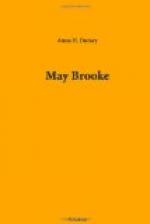“Had you no other instructor?” inquired Helen.
“Oh yes. Father Fabian. He instructed me in the divine mysteries of our holy faith. He has been my director ever since I was a little child. But how was it with you, dear Helen?”
“I have lived a great deal with Protestants, May,” replied Helen, after a short pause. “My father was a major in the army—the only brother of the old man here. He was a Catholic, but he was always so full of official business that he had very little time to attend to religion, and all that kind of thing. His official duties engrossed his time entirely. But he always impressed it on my mind that it would be extremely dishonorable not to avow myself a Catholic when occasions demanded it; and I believe he would have been pleased to see me practise my faith. I was sent to a convent school in Louisiana when I was ten years of age, but was suddenly removed, to accompany my father to Boston, to which place he was ordered. There I was surrounded by persons of fashion and position, who made eyes at me when I told them I was a Catholic, and declared I would lose caste if I went to a church which was attended only by the ‘low Irish, and servant girls.’ Then I heard Catholics derided as superstitious and ignorant, until, I must confess it, I grew ashamed of being one. My father was too busy to think of me,—he always saw me well-dressed and in good company, and imagined that all else was going well with me; while I, proud, flattered, and enjoying the world, fancied that it was of little importance while I was so young. My poor father was a brave and gallant officer; and I think when he sometimes declared with a dignified air that ’he and his daughter were Catholics,’ it was more from the feeling which makes a soldier swear by his flag, than any higher motive. This has been my religious training; but my dear, indulgent father is dead—gone for ever, and I am here—here—Oh, May!” and Helen wept on May’s shoulder.
“And how, dear Helen, did my uncle die?” said May, in a tone of tender sympathy.
“Very suddenly. He was not conscious from the moment he was taken ill until he died,” she replied.
May could not utter a word. Her heart was filled with a strange horror at the idea of that sudden and unprovided death. She could have cried out with anguish for that soul, which, in the midst of its careless pride and criminal indifference, had been summoned by an inexorable decree to the tribunal of judgment! where it appeared alone—alone—alone, to be weighed in the balance of justice. “But, perhaps, sweet Jesus!” she whispered; “oh, perhaps, Thou didst in the last struggle hear it from its abyss of misery plead for mercy; perhaps, through thy bitter passion and death Thou didst rescue him from eternal woe—”
“What are you saying, May! No doubt I have shocked you; you are so very pious!”




